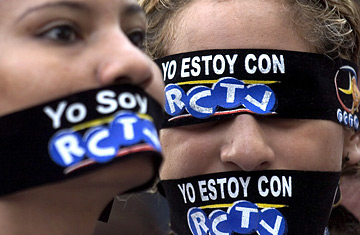
Venezuelan citizens cover their eyes and mouths outside RCTV's studios in Caracas, Venezuela, May 27, 2007, during a rally against President Hugo Chavez's decision to revoke the network's license.
Students skirmished with policemen across Venezuela on Monday, and continued dodging tear gas and rubber bullets on Tuesday, protesting what they called diminished press freedom. But if you were one of the many Venezuelan television viewers who don't get 24-hour news channel Globovision, you might not have seen the protests. That's because besides the station available only on pay cable outside of Caracas and Valencia, other networks barely covered the demonstrations.
Channel 2 on the dial, which had been home to opposition-aligned Radio Caracas Television until Sunday, would have jumped at the chance to show the events. But the reason the students had taken to the streets was precisely to protest the government's forcing RCTV off the airwaves, at midnight Sunday, by refusing to renew its broadcast license. The country's oldest channel had been replaced by state-run TVes, which showed cartoons and old movies during the protests. Critics of President Hugo Chavez warn that when the smoke clears, the television landscape will be largely bereft of independent voices willing to criticize the government.
The government counters that many smaller privately owned TV channels still exist, and that the country's two largest newspapers remain opposition-inclined. The state, they say, is simply exercising its prerogative not to issue a broadcast license — as a response to RCTV's support for a failed 2002 coup attempt against Chavez, and its flooding the airwaves with anti-government programming. RCTV, like the majority of the media, was certainly heavily biased against Chavez during his first years in power. And the continued anti-Chavez line of RCTV's execs is no secret. After telling TIME on Sunday that Chavez was headed "towards a totalitarian regime," RCTV chairman Marcel Granier scoffed at those who "still believe that there is democracy in Venezuela."
In this extremely polarized society, media outlets have been known to behave more as political actors than objective observers. Still, other leading privately owned networks such as Venevision have allayed their criticism of the government. Local journalists say that a media law that increases penalties for slander has encouraged self-censorship. And even media owners soft on Chavez admit that the constant pro-government trailers and late-night slandering of the opposition on the main state-run channel, Venezolana de Television, is little more than propaganda. The international response hasn't been favorable either, as the European Union and the U.S. Senate have expressed concern.
Only hours after RCTV went off the air, the government was already threatening Globovision, the lone opposition TV holdout. Information minister Willian Lara announced Monday that the government would investigate the channel for allegedly inciting an assassination attempt on Chavez. As evidence, he showed footage of a 1981 assassination attempt on Pope John Paul II accompanied by Salsa star Ruben Blades singing "Have faith, this does not stop here." Lara also accused CNN of inciting violence against Chavez and "campaigning against Venezuela" by showing Chavez's image next to a picture of an al-Qaeda leader. On Tuesday, in a speech that all TV stations were obliged to broadcast, Chavez suggested Globovision "take a tranquilizer, that they slow down, because if not, I'm going to slow them down." Globovision president Alberto Federico Ravell denied the accusations, saying they "won't change our editorial line" and calling his channel "the last bastion of independent television."
Paradoxically, only four years ago, Chavez praised CNN for being the first media to report that he had not given in to the coup. As for Venezuela's private TV channels, Chavez may never have gained the popularity he needed to be elected president if it weren't for the spotlight that they gave him after he led a failed coup d'etat against the government in 1992. His brief speech, including the famous comment that "For now, the objective that we set out was not achieved," helped him become a national hero and doubtless assisted him when he was released from prison and ran for president six years later. For now, however, that irony is lost on his government.
